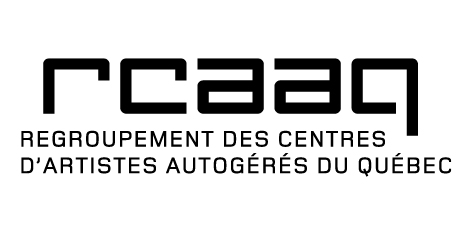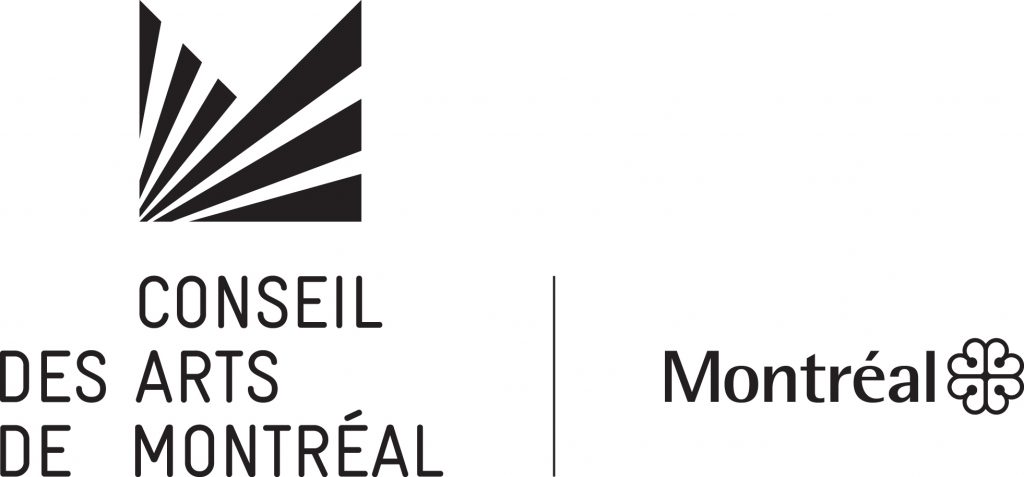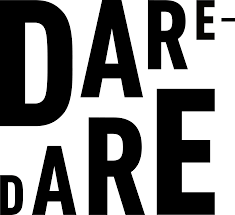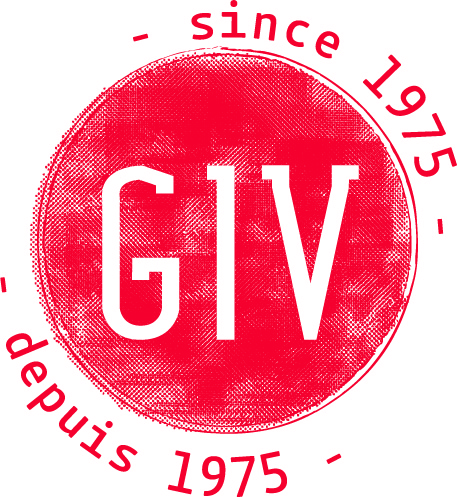Anamely Ramos González Camila Ramírez Lobón Analays Álvarez Hernández Raquel Cruz Crespo An Open Wound Exposed to the Elements: Diaspora, Exile and Contemporary Cuban Art Today
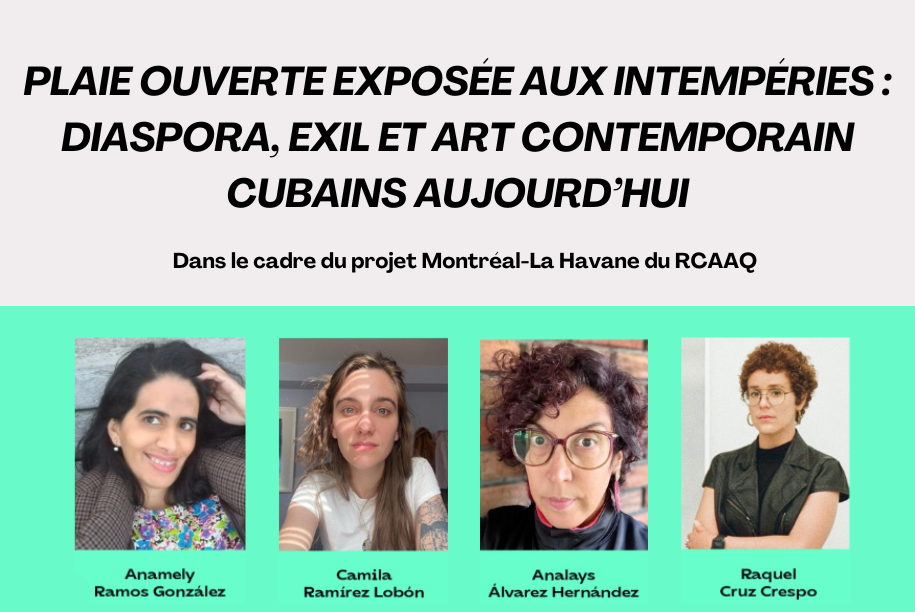
As part of RCAAQ's Montréal/La Havane exchange project Naming the Urgency: Contemporary Art and Diaspora in Present-Day Cuba, in collaboration with artist-run centres DARE-DARE, GIV and OBORO
A conversation with curator Anamely Ramos González and artist Camila Ramírez Lobón, moderated by curators Analays Alvarez Hernandez and Raquel Cruz Crespo
The recent Cuban diaspora, especially the one forming from 2021 onwards, is revealing two novel elements inherent to its singularity in the post-revolutionary diasporic narrative. The first is staggering: we are witnessing an unprecedented flight from the Iisland (almost a million people if we only count those who have arrived in the United States), marked in particular by immense class disparities. These inequalities are reflected in the arts scene, where access to cultural production and dissemination venues, as well as opportunities for creation and income, vary considerably. On the other hand, the arrival of the Internet since 2016 has transformed forms of socio-political expression and articulation in Cuba, giving rise to new types of socio-artistic movements and coalitions advancing frontal critiques of power. Movimiento San Isidro and 27N emerged in a landscape marked by widespread social frustration, which culminated in the demonstrations of July 2021, to which the government responded with severe repression. Many people left the island the next day, voluntarily or otherwise, to escape reprisals and seek better living conditions and greater freedoms.
We're only just beginning to grasp the impact of these recent shifts on the visual arts, including the expansion and multiplication of the epicenter of Cuban art outside the Iisland. It is therefore urgent to reflect on what contemporary Cuban art is, insisting on the need to no longer confine it to the physical borders of Cuba, but to recognize that the Cuban diaspora actively participates in its definition. In today's complex context, in what ways is the recent diaspora redefining the country that Cuba has become today? How does it redefine the geopolitical contours of contemporary Cuban art?
Established in 2011 by the RCAAQ and the Conseil des arts de Montréal, the Montréal/La Havane exchange project promotes the circulation of individuals, ideas and knowledge, not only in established circuits, but above all, in those in the making. By setting up a residency and networking structure, this project aims to develop creative dialogues between artists and curators from different cultures. It enables participants to immerse themselves in a new space of creation-reflection, different from their own, with the aim of encouraging partnerships and long-term projects.

Anamely Ramos González (Camagüey, Cuba, 1985) holds a degree in Art History from the Universidad de La Habana (2007) and a Master’s in Cuban Cultural Processes from the Universidad de las Artes (2014). She is currently pursuing a Ph.D. in Social Anthropology at the Universidad Iberoamericana de México. Since August 2024, she has been a visiting researcher at the University of Illinois, Chicago. Formerly a professor of Cuban and African Art at the Universidad de las Artes de Cuba, she was expelled in 2019 due to political discrimination. For over a decade, she curated exhibitions in abandoned spaces in Havana and Camagüey. She writes for El Estornudo and other independent Cuban journals. As a human rights activist, she participated in the campaign against Decree 349 and was part of the San Isidro Movement. After leaving Cuba in 2021, she has remained active in the diaspora, collaborating with international organizations to raise awareness of human rights violations in Cuba. In February 2022, she attempted to return to the Island twice but was denied boarding by order of the Cuban government.
Camila Ramírez Lobón (Camagüey, Cuba 1995). Her visual practice focuses on the narration and illustration of a social and political imaginary that subverts the Cuban totalitarian narrative through individual memory. A graduate of the Academia de Arte de Camagüey in 2014 and the Instituto Superior de Arte de La Habana in 2019, she has worked as coordinator of the Hannah Arendt Institute of Artivism (INSTAR), founded by artist Tania Bruguera. Among her solo exhibitions are Epizootia (Zapata Gallery, Miami, 2024) and El país perdido (Aveces Art Space, Havana, 2019). Her work has been exhibited in Havana, New York, Montreal, Buenos Aires, Berlin, Kassel and Prague. Lobón is a columnist for the independent Cuban magazine Hypermedia and a member of the Ánima collective. She has actively participated in independent cultural and civic initiatives that, in recent years, have been at the forefront of advocating for freedom of expression and political rights in Cuba, including the 27N group and the San Isidro Movement.
Analays Álvarez Hernández is an art historian and independent curator. Born in Havana, she has been living and working in Montreal since 2006. She holds a Bachelor’s degree in Art History from the Universidad de La Habana (2005) and a Ph.D. in Art History from UQAM (2015). Her research interests include public art, global art histories, Latinx-Canadian art, and decoloniality. As a curator, she has organized exhibitions both in Cuba and Canada. Among her recent projects are The Recipe: Making Latin American Art in Canada (2018, Sur Gallery; 2020, OBORO), Au fil des îles, archipels (2022, Galerie de l’UdeM; 2023, Musée régional de Rimouski), and On Americanity and Other Experiences of Belonging (Onsite Gallery, Toronto, 2023). She is also part of the curatorial team for the first edition of the UdeM Triennale of Research-Creation (2025). Álvarez Hernández is an Associate Professor in the Department of Art History, Cinema, and Media Studies at the Université de Montréal.
Raquel Cruz Crespo is a curator with a BA in Art History from the Universidad de La Habana and an MA in Sociology from the Institut National de la Recherche Scientifique. She is interested in artist residencies, cultural mediation and alternative art spaces. Previously, she was artistic programming coordinator at DARE-DARE and is currently cultural events assistant at the Maison de la culture Claude-Léveillée.
